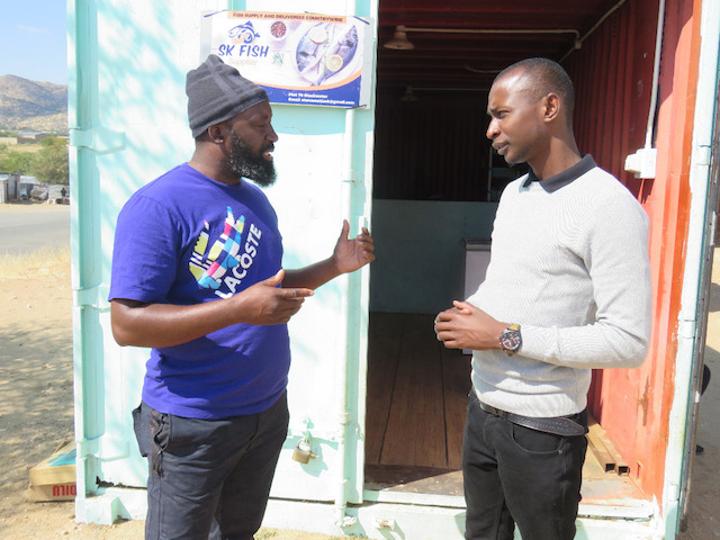Africa-Press – Namibia. WHEN enterprising Albinos Kundishishi saw the suffering that the people of Mix Settlement at Brakwater endured to acquire food like fish and chicken, he decided to provide a solution.
“Mothers complained that it was expensive to hike 20 kilometres to Windhoek only to buy a few pieces of fish to cook in one day, as they have no storage facilities at the informal settlements where there is no electricity,” he said.
To bring this food closer to the people, he started selling fish from his home at the settlement in 2015, but because of limited sales he decided to drive around the settlement selling fish from the boot of his car.
“I could only do this after work as a sound technician with Ndilimani Cultural Group. I could only sell for a few hours before it got dark and by then most potential customers would have made other arrangements for the night,” he said.
He then decided to open a small shop from a ship container, where he trades as Oshivelelwa Koshiwana – SK Fish Supplier, which is open throughout the day.
This, however, presented the challenge of how he would store his fish.
By dint of luck, a representative of Furntech, a Windhoek company supplying renewable energy systems, came to the settlement to promote their solar energy systems and he convinced Kundishishi to try it.
“I was sceptical at first but with no alternative source of electricity, I decided to give it a try. I installed the solar system in July last year and it came with solar panels, a set of batteries enclosed in a sealed box, a deep freezer and two lights. The system has never given me any problems since.
“This boosted my business, as people can now buy frozen foods near them whenever they want,” said Kundishishi who sells various types of fish including angel fish, jacopever, maasbanker (mackerel) and John Dory.
On a good day he makes around N$1 500 in sales, while a bad day can still see him bring in N$600.
Kundishishi, who employs one person at the shop, also sells free range chicken popularly known as marathon chicken.
Although he has now installed a renewable energy system, he says he still faces the challenge of storing stock in bulk and is considering increasing the number of freezers he uses.
“Because I do not buy stock in bulk, I incur transport costs through making frequent trips to bring fish from Windhoek. In addition, I lose out on discounts offered by suppliers because my orders are not big enough to qualify.”
Kundishishi said he was not aware of the solar revolving fund (SRF) run by the Ministry of Mines and Energy, to give financial assistance to Namibians, including business persons, to purchase renewable energy systems.
“If I had known I would have been the first one knocking at their doors,” he said.
According to SRF deputy director Ishuna Niita Amakutsi, the fund runs on an ownership model where individuals obtain loans to purchase renewable energy technology products and the ministry is, therefore, financing the acquisition of stand-alone systems to provide renewable energy.
“This is a subsidised loan where beneficiaries will pay 5% interest a year over a repayment period of five years,” she said early last month.
Kundishishi said renewable energy is the future for businesses in the informal settlements, as well as people in rural areas where there is no electricity.
“Solar energy systems are good in that you pay for them once and when you are done paying, the system becomes yours and you do not worry about electricity bills anymore,” he said.
Furntech representative Lilongeni Unovene advised businesspersons and ordinary Namibians to approach the Ministry of Mines and Energy, as well as financial institutions for assistance to install renewable energy systems.
“While our company does not offer terms yet, there are institutions that can help those who want to install the systems in their homes,” he said.
Kundishishi advised Namibians to do the little they can to improve their lives, even if they start small.
“Most people, especially the youth, suffer because they do not stand up to do things for themselves. For example, I employ one person in my shop but that has an impact on her, her children, her mother, brothers and other members of her family.
“If everyone could do a little more, Namibia would be a better country for all of us,” he said.
For More News And Analysis About Namibia Follow Africa-Press






